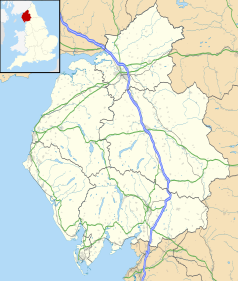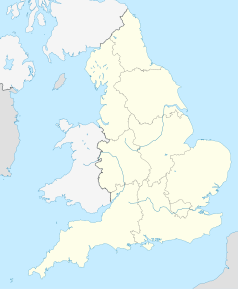Grange-over-Sands
| ||
(c) Ian Petticrew, CC BY-SA 2.0 | ||
| Państwo | ||
| Kraj | ||
| Region | North West | |
| Hrabstwo | Kumbria | |
| Dystrykt | South Lakeland | |
| Populacja (2011) • liczba ludności | 4114 | |
| Nr kierunkowy | 015395 | |
| Kod pocztowy | LA11 | |
Położenie na mapie Kumbrii Contains Ordnance Survey data © Crown copyright and database right, CC BY-SA 3.0 | ||
Położenie na mapie Wielkiej Brytanii (c) Karte: NordNordWest, Lizenz: Creative Commons by-sa-3.0 de | ||
| Portal | ||
Grange-over-Sands − miasto i civil parish portowe w Wielkiej Brytanii, w Anglii, w hrabstwie Kumbria, w dystrykcie South Lakeland[1]. W 2011 roku civil parish liczyła 4114 mieszkańców[2].
Przypisy
- ↑ Ordnance Survey linked data
- ↑ Neighbourhood Statistics. [dostęp 2015-12-18]. [zarchiwizowane z tego adresu (2015-12-23)].
Media użyte na tej stronie
Contains Ordnance Survey data © Crown copyright and database right, CC BY-SA 3.0
Map of Cumbria, UK with the following information shown:
- Administrative borders
- Coastline, lakes and rivers
- Roads and railways
- Urban areas
Equirectangular map projection on WGS 84 datum, with N/S stretched 170%
Geographic limits:
- West: 3.80W
- East: 2.10W
- North: 55.20N
- South: 54.02N
(c) Karte: NordNordWest, Lizenz: Creative Commons by-sa-3.0 de
Location map of the United Kingdom
Flag of England. Saint George's cross (a red cross on a white background), used as the Flag of England, the Italian city of Genoa and various other places.
(c) Ian Petticrew, CC BY-SA 2.0
Main Street at Grange-over-Sands Grange-over-Sands is a small Cumbrian seaside town lying on the north side of Morecambe Bay. Originally a small fishing village, Grange developed during the second half of the 19th Century with the arrival of the Lancaster & Ulverston Railway (later absorbed into the Furness Railway), when it became a popular seaside resort and much of this is evident in the Town's (mostly unspoiled) Victorian architecture.









